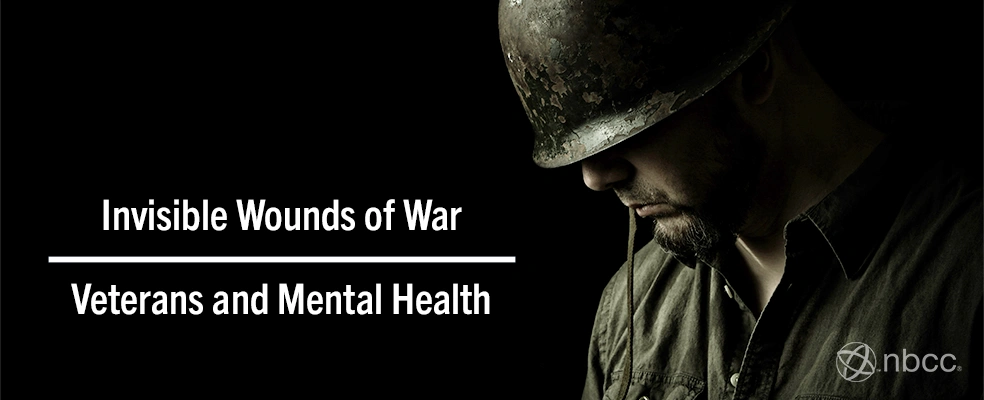
A 2021 study by the Wounded Warrior Project provided some remarkable insights into the mental health of veterans. Among those surveyed, 48.2% had at least one instance of suicidal ideation in their lives and 15.5% had attempted suicide once. Considering that the Department of Veterans Affairs (VA) estimates the number of veterans to be about 19 million helps put into perspective the vast number of individuals struggling with mental health concerns.
The National Institute on Drug Abuse (NIDA) estimates that 37%–50% of the veterans who served in Iraq and Afghanistan have since been diagnosed with a disorder linked to an SUD, and 63% of those individuals also have PTSD. Additionally, service members have a rate of depression 5 times higher than civilians, according to the National Alliance on Mental Illness (NAMI).
For veterans who are seeking mental health services, there are several resources available from the VA. More than 1.7 million veterans received treatment in a VA mental health specialty program in fiscal year 2018, according to the VA’s Office of Research & Development. The U.S. Government Accountability Office reported that one-third of those individuals had at least one diagnosed mental health condition. The VA offers several evidence-based programs and other resources to address the needs of veterans:
- Outpatient Clinics: There are 755 outpatient clinics that provide primary and specialty outpatient mental health services.
- Vet Centers: There are more than 300 Vet Centers and mobile units that offer readjustment counseling services, including individual, group, and marriage counseling, to veterans and their families.
- Medical Centers: 170 VA medical centers provide inpatient, outpatient, and residential care.
- Community Care: Some veterans across the country can receive inpatient or outpatient mental health services from non-VA providers when they face certain challenges such as long waiting periods or travel distances.
- Veterans Crisis Line: A toll-free, confidential Veterans Crisis Line is available by calling 1-800-273-8255 (1-800-273-TALK) or 9-8-8, or by texting #838255. Veterans and their families can also chat at VeteransCrisisLine.net. The line is available 24/7 and is staffed by mental health professionals.
- War Vet Call Center: Veterans can talk about their military experience and transitioning to civilian life with other veterans and their families by calling 1-800-927-8387.
- Women Veterans Call Center: This center, reached by calling 1-855-829-6636 (1-855-VA-WOMEN), provides VA services and resources to women veterans and their families. A chat feature is also available at womenshealth.va.gov/.
- Make the Connection: This site features more than 400 stories shared by veterans about strength and recovery. It also provides mental health resources including podcasts and videos.
Mental health resources are also available from several organizations outside of the VA. They include:
The U.S. Department of Defense’s Real Warriors Campaign, which provides information about PTSD and traumatic brain injury. It is available 24/7 at 1-866-966-1020 and is offered through the Defense Centers of Excellence for Psychological Health and Traumatic Brain Injury.
The National Veterans Foundation addresses crisis management. Its Lifeline for Vets, a vet-to-vet service, helps provide resources for vets seeking counseling and those with other needs. The number is 888-777-4443.
Additional efforts to increase access to mental health care services for veterans are being made at the federal level.
NBCC has advocated for increased recognition and hiring of professional counselors by the VA for several years, efforts that resulted in the passage of a law in 2006 adding licensed professional mental health counselors to the list of professions eligible for VA employment.
Additionally, the Commander John Scott Hannon Veterans Mental Health Care Improvement Act was signed into law in October of 2020. It will address mental health care delivery issues in the VA including suicide prevention, integrating mental health care services and primary care, and updating clinical practice guidelines.
In conclusion, the unique challenges and experiences that members of our military and their families face necessitate increased access to reliable, culturally informed mental health services specific to their needs.
Counselors can learn more about mental health and military and veteran populations with these courses and others from The Professional Counselor:
- S. Army Soldiers’ Trust and Confidence in Mental Health Professionals
- Military Spouses’ Perceptions of Suicide in the Military Spouse Community
- Helping Military Parents Cope
- Counselors and the Military: When Protocol and Ethics Conflict
The following free webinars are available at CCE Academy:
- Understanding Suicide and Prevention in Service Members
- Counseling Military Service Members and Their Families
- Understanding Military Families: Principles, Culture, and Interventions in the Counseling Process
- Spiritual Care for Suicidal Veterans: Pilot Study of the Impact on Substance Abuse, Treatment Compliance, and Suicide Prevention